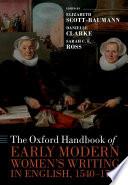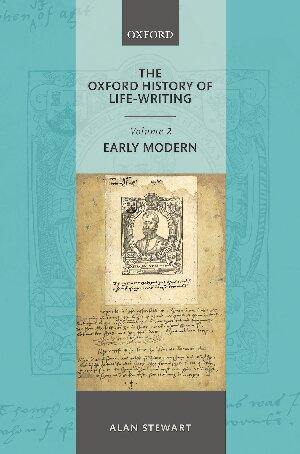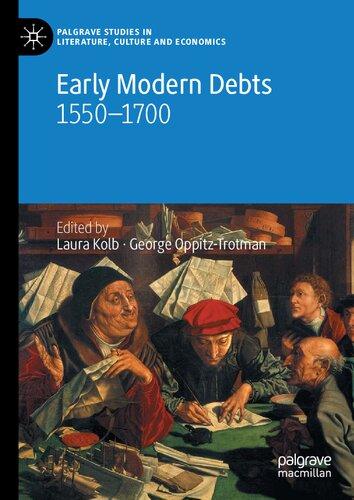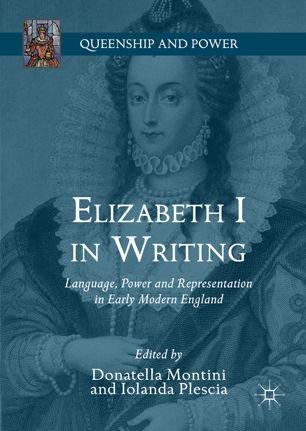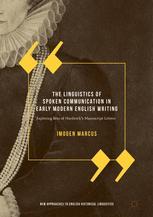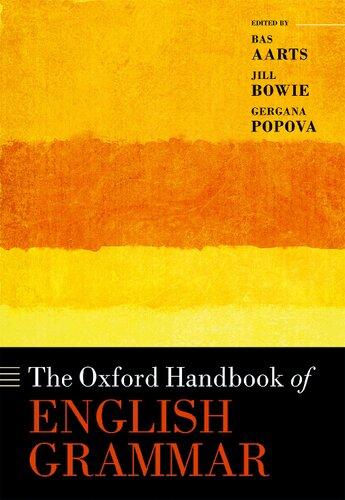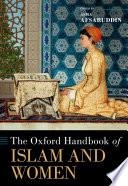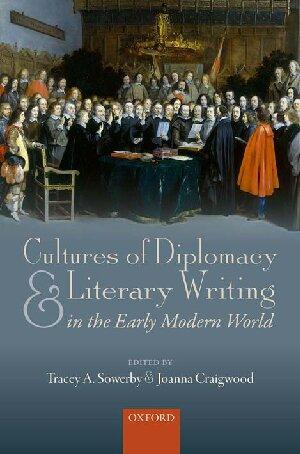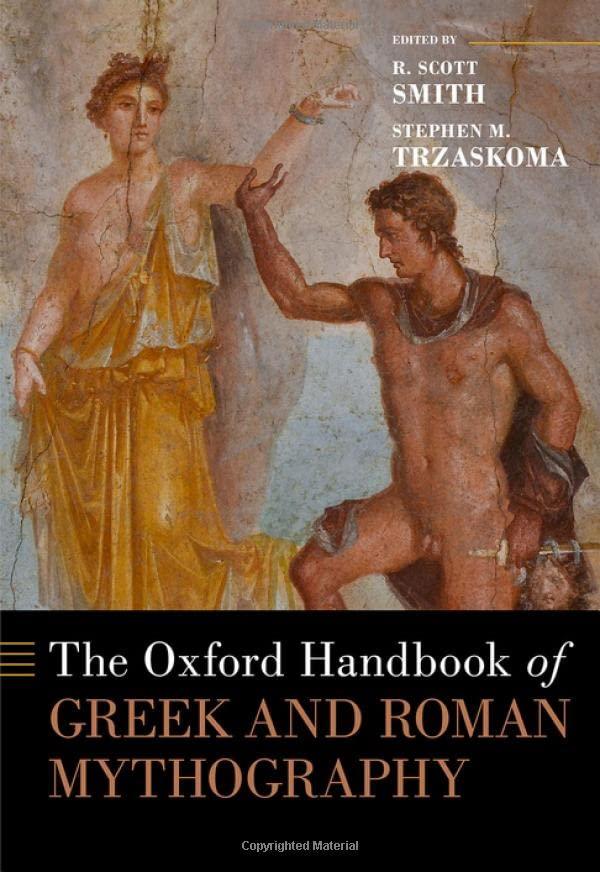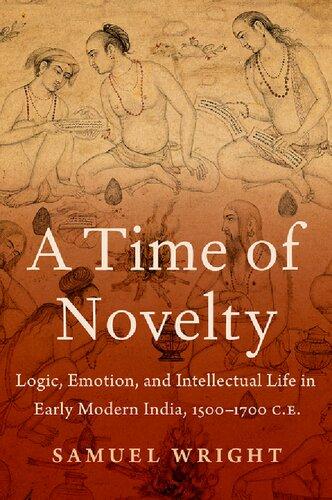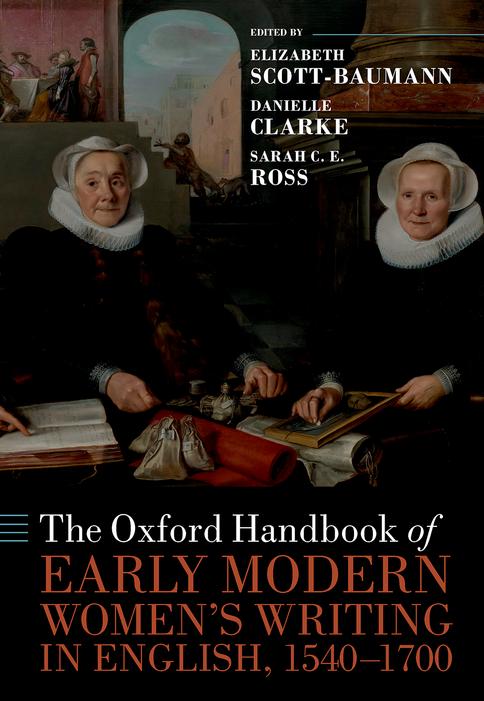Acknowledgements
We have many people to thank for their support for this book, but first and foremost we would like to pay tribute to the enthusiasm, determination, and resilience of our contributors who never wavered in their commitment to the project despite the very real challenges posed by Covid-19. The project has for the most part been completed over two years of lockdowns and travel restrictions, and the scholars represented in this volume have been a community of conversation and a mainstay of hope through global networks realised only electronically. We would also like to thank here the librarians and archivists who worked so hard to enable access to collections and texts and the wider community of early modern scholars who assisted with locating articles and primary texts, often from their personal archives.
We have been privileged to work with Emma Rayner, Victoria Coldham-Fussell, Emer McHugh, and Harriet Hughes, each of whom brought their insight and vision to the project. We are grateful to them for all of their careful work on these chapters and for their support for the Handbook’s aims and principles—it is a better piece of scholarship because of their input.
We would like to thank Kate Chedgzoy, Jane Grogan, and Sarah McKibben for their incisive and perceptive comments on Chapter 1, and wish to acknowledge the generosity of Jaime Goodrich and Paula McQuade, and the contributors to the double special issue of Criticism, ‘Beyond Canonicity: The Future(s) of Early Modern Women’s Writing’ (2021) for allowing us to read these provocative and challenging essays in advance of publication. These framed and guided our thinking in profound ways.
At Oxford University Press, we wish to thank Jacqueline Baker for her initial interest in this idea, and Eleanor Collins, Aimee Wright, Karen Raith, and Emma Collison for guiding us from commissioning to submission. We would also like to thank Marilyn Inglis, Dawn Preston, and Kayalvizli Ganesan for their copy-editing and production work. And thank you to Francis Young for the index.
Funding for editorial assistance and indexing is gratefully acknowledged from the College of Arts and Humanities at University College Dublin, the English Department at King’s College London, and the Faculty of Humanities and Social Sciences at Te Herenga Waka—Victoria University of Wellington.
We are very grateful to the following institutions for allowing us to reproduce images: Victoria and Albert Museum London; The New York Public Library; Folger Shakespeare Library; Royal Collection Trust; Koninklijke Bibliotheek; Rijksmuseum; Bodleian Library, University of Oxford; National Records of Scotland; Lakeland Art Trust—Abbott Hall Gallery and Museum.
To say that the editing of this book presented some domestic challenges would be an understatement: between us we have children ranging from those on the cusp of adulthood to those born during this book’s production, and we think that we understood many of the women represented in this volume better, as we attempted to produce intellectual work in sometimes fraught and crowded domestic spaces. We would like to thank our families: Róisín, Asher, and Annie (Danielle); Benjie, Edward, Will, and Phoebe Way and Mike and Alison Scott-Baumann (Lizzie); and Andru, Milly, and Henry Isac (Sarah).
Danielle
Sarah C. E. Ross,
Elizabeth Scott-Baumann
PART I VOICE AND KNOWLEDGE
PART II FORMS AND ORIGINS
9. The Querelle des Femmes, the Overbury Scandal, and the Politics of the Swetnam Controversy in Early Modern England 127
Christina Luckyj
10. The Songscapes of Early Modern Women 143
Katherine R. Larson
11. Receiving Early Modern Women’s Drama 157
Ramona Wray
12. ‘Sing and let the song be new’: Early Modern Women’s Devotional Lyrics 173
Helen Wilcox
13. Lyric Backwardness 189
Dianne Mitchell
14. ‘People of a Deeper Speech’: Anna Trapnel, Enthusiasm, and the Aesthetics of Incoherence 203
Kevin Killeen
15. Commonplacing, Making Miscellanies, and Interpreting Literature 217
Victoria E. Burke
16. Women’s Life Writing and the Labour of Textual Stewardship 231
Julie A. Eckerle
17. Women and Fiction 245
Lara Dodds
18. Romance and Race 261
V. M. Braganza
PART III PLACES
19. A Place-Based Approach to Early Modern Women’s Writing 277
Paula Mcquade
20. London and the Book Trade: Isabella Whitney, Jane Anger, and the ‘Maydens of London’ 291
Michelle O’callaghan
21. The Self-Portrayal of Widows in the Early Modern English Courts of Law
Lotte Fikkers
22. The World of Recipes: Intellectual Culture in and around the Seventeenth-Century Household 319
Wendy Wall
23. Daughters of the House: Women, Theatre, and Place in the Seventeenth Century
Julie Sanders
24. Changing Places: Relocating the Court Masque in Early Modern Women’s Writing
Laura L. Knoppers
25. Race and Geographies of Escape in Elizabeth Cary’s The Tragedy of Mariam
Meghan E. Hall
26. Archipelagic Feminism: Anglophone Poetry from Ireland, Scotland, and Wales
Sarah Prescott
PART IV TRANSLINGUAL AND TRANSNATIONAL
27. ‘Mistresses of tongues’: Early Modern Englishwomen, Multilingual Practice, and Translingual Communication 393
Brenda M. Hosington
28. ‘The Surplusage’: Margaret Tyler and the Englishing of Spanish Chivalric Romance
Jake Arthur
29. French Connections: English Women’s Writing and Préciosité
Line Cottegnies
30. Old England And New in Anne Bradstreet’s Poetry
Peter Auger
31. Early Modern Dutch and English Women Across Borders 451
Martine Van Elk
32. Political Theory Across Borders 469
Mihoko Suzuki
PART V NETWORKS AND COMMUNITIES
33. Networked Authorship in English Convents Abroad: The Writings of Lucy Knatchbull 487
Jaime Goodrich
34. Gifts That Matter: Katherine Parr, Princess Elizabeth, and the Prayers Or Meditations (1545) 501
Patricia Pender
35. Elizabeth Melville: Protestant Poetics, Publication, and Propaganda 517
Sebastiaan Verweij
36. Desire, Dreams, Disguise: The Letters of Elizabeth Bourne 531
Daniel Starza Smith And Leah Veronese
37. Women’s Letters and Cryptological Coteries 547
Nadine Akkerman
38. Non-Elite Women and the Network, 1600–1700 563
Susan Wiseman
39. ‘On the Picture of Ye Prisoner’: Lucy Hutchinson and the Image of the Imprisoned King 579
Hero Chalmers
40. The Topopoetics of Retirement in Katherine Philips and Lucy Hutchinson 595
James Loxley
41. Early Modern Women in Print and Margaret Cavendish, Woman in Print 611
Liza Blake
PART VI TOOLS AND METHODOLOGIES
42. Editing Early Modern Women’s Writing: Tradition and Innovation 625
Paul Salzman
43. Reception, Reputation, and Afterlives 641
Marie-Louise Coolahan
44. ‘A Telescope for the Mind’: Digital Modelling and Analysis of Early Modern Women’s Writing 657
Julia Flanders
45. Material Texts: Women’s Paperwork in Early Modern England and Mary Wroth’s Urania 673
Anna Reynolds
46. Memory and Matter: Lady Anne Clifford’s ‘Life of Mee’ 687
Patricia Phillippy
47. Early Modern Women, Race, and Writing Revisited 703
Bernadette Andrea
48. Touches Across Time: Queer Feminism, Early Modern Studies, and Aemilia Lanyer’s ‘Rich Chains’ 717
Erin Murphy
49. Untimely Developments: Periodisation, Early Modern Women’s Writing, and Literary History 735
Michelle M. Dowd
List of Illustrations
Figure 5.1 Esther and Ahasuerus (1665), Museum no. T.125-1937 © Victoria and Albert Museum London.
Figure 22.1 Hesrer (Hester) Denbigh, Cookery and Medical Receipts. Whitney Cookery Collection, Manuscripts and Archives Division, The New York Public Library, Astor, Lenox and Tilden Foundations, MssCol 3318, 1700, vol. 11, fol. 1.
Figure 22.2 Title page to Hannah Woolley, The Queen-Like Closet; or, Rich Cabinet (London, 1675). Used by permission of the Folger Shakespeare Library under a Creative Commons AttributionShareAlike 4.0 International License.
Figure 22.3 Lettice Pudsey Her Booke of Receipts, c 1675, Folger Shakespeare Library, MS V.a.450, fol. F7v. Used by permission of the Folger Shakespeare Library under a Creative Commons AttributionShareAlike 4.0 International License.
72
322
330
332
Figure 24.1 Gerrit van Honthorst, Apollo and Diana (1628). Royal Collection Trust © Her Majesty Queen Elizabeth II, 2020/Bridgeman Images. 352
Figure 31.1 Anna Maria van Schurman, Nobilis. virginis Annae Maria à Schurman Opuscula Hebraea, Graeca, Latina, Gallica. Prosaica et Metrica (Leiden, 1648), sig. *4v. Koninklijke Bibliotheek, The Hague. Shelfmark KW 188 L 6.
455
Figure 31.2 Johan Tillotson, Predicatie Gedaan in de Kapel van Lincolns-Inn, tot London, op den 10. February. 1689 (Amsterdam, 1689), title page. Koninklijke Bibliotheek, The Hague. Shelfmark KW Pflt 13171. 460
Figure 31.3 Louis Surugue and Nicolaas Verkolje, frontispiece engraving, Katharina Lescailje, Toneel- en mengelpoezy (Amsterdam, 1731), volume 1. Rijksmuseum, Amsterdam. Object number RP-P-OB-74.381.
464
Figure 32.1 John Selden, Titles of Honor (1631), 876. STC 22178, copy 3. Photography by Mihoko Suzuki, from the collection of Folger Shakespeare Library. 481
Figure 34.1 Elizabeth I’s gift book designs, 1544–1545. 506
Figure 34.2 Elizabeth I. 1544. ‘Le miroir de l’âme pécheresse’ (‘The Mirror of the Sinful Soul’). MS. Cherry 36, binding/upper cover. Bodleian Library, University of Oxford. 507
Figure 34.3 Elizabeth I. 1545. Religious book written by Princess Elizabeth (later Queen Elizabeth I of England) for her stepmother, Katherine Parr, 1545. RH13/78. National Records of Scotland. Used with permission. 509
Figure 34.4 Elizabeth I. Prayers and meditations (the ‘Prayerbook of Princess Elizabeth’). BL Royal MS 7 D. X., embroidered back cover. © British Library Board. 510
Figure 39.1 Eikon Basilike (1649). Bodleian shelfmark, Vet. A3 e. 316. Frontispiece. This image is reproduced by kind permission of the Bodleian Library, The University of Oxford. 583
Figure 46.1 Jan van Belcamp, attrib. The Great Picture (1646). Lakeland Art Trust—Abbott Hall Gallery and Museum, Kendal. Creative Commons—Public Domain. 695
Figure 46.2 Maximillian Colt, Monument for Margaret Clifford, Countess of Cumberland (1617). St Lawrence’s Church, Appleby, Westmorland. Photograph by Jessica L. Malay. Used with permission. 697
Figure 46.3 The Countess Pillar (1656). Brougham, Westmorland. Photograph by Ian Taylor. Creative Commons Attribution-Share Alike 2.0 Generic license.
Figure 46.4 The Lady Pillar. Hugh Seat Morville (1664). Photograph by Michael Graham, Creative Commons Attribution-Share Alike 2.0.
698
700
List of A bbreviations
EEBO Early English Books Online
ODNB Oxford Dictionary of National Biography
OED Oxford English Dictionary (online)
PLRE Private Libraries in Renaissance England
PMLA Publications of the Modern Language Association of America
RECIRC The Reception and Circulation of Early Modern Women’s Writing 1550–1700
STC Short Title Catalogue
List of C ontributors
Nadine Akkerman is Professor in early modern English Literature at Leiden University. She is author of the critically acclaimed Invisible Agents: Women and Espionage in Seventeenth-Century Britain (OUP), and of The Correspondence of Elizabeth Stuart, Queen of Bohemia (OUP), the third and final volume of which will be published in 2023. Her latest book is a biography, Elizabeth Stuart, Queen of Hearts (OUP, 2021). She has also published extensively on women’s history, diplomacy, and masques, and curated several exhibitions, including the popular ‘Courtly Rivals’ at the Haags Historisch Museum. In 2017 she was elected to The Young Academy of the Royal Netherlands Academy of Arts and Sciences, and received a Special Recognition Award from the World Cultural Council. Most recently, in April 2019, she received an Ammodo Science Award for fundamental research in the humanities, while a Visiting Fellow at All Souls’ College, Oxford.
Bernadette Andrea is Professor of Literary and Cultural Studies in the Department of English at the University of California, Santa Barbara. She is the author of The Lives of Girls and Women from the Islamic World in Early Modern British Literature and Culture (University of Toronto Press, 2017) and Women and Islam in Early Modern English Literature (Cambridge University Press, 2007). She edited and introduced English Women Staging Islam, 1696–1707 (University of Toronto, Centre for Reformation and Renaissance Studies, 2012) for the series ‘The Other Voice in Early Modern Europe’. Her co-edited collections include Travel and Travail: Early Modern Women, English Drama, and the Wider World, with Patricia Akhimie (University of Nebraska Press, 2019), and Early Modern England and Islamic Worlds, with Linda McJannet (Palgrave Macmillan, 2011). She currently serves as a co-editor, with Julie Campbell and Allyson Poska, of Early Modern Women: An Interdisciplinary Journal, and is the President of the Shakespeare Society of America.
Jake Arthur is a DPhil candidate and Clarendon Scholar at Oxford University. He has recently completed his thesis examining early modern women’s work in translation and paraphrase. Titled ‘“The stuffe not ours”: the work of derivation in women’s writing, 1560–c.1664’, the thesis seeks to reclaim the expressive and intellectual possibilities of ‘derivative’ works. In collaboration with Sarah C. E. Ross, he is co-editor of the poetry section of The Palgrave Encyclopedia of Early Modern Women’s Writing. He also has work published in The Seventeenth Century and Early Modern Women: An Interdisciplinary Journal, and a chapter in Early Modern Women and Complaint: Gender, Form, and Politics.
Peter Auger is Lecturer in Early Modern Literature at the University of Birmingham. His first monograph, Du Bartas’ Legacy in England and Scotland, was published in 2019. He continues to work on Franco-British literary relations, and has written articles and book chapters on topics including transnational and comparative literature, literary reception, translation and imitation practices, the history of reading, manuscript studies, epic and religious poetry, language learning, and cultural diplomacy. With Sheldon Brammall, he is editing a volume of essays about multilingual practices in early modern Europe.
Liza Blake is an Associate Professor of English at the University of Toronto, working at the intersection of literature, science, and philosophy in early modernity, with additional interests in women writers, textual bibliography, and scholarly editing. She has articles published and forthcoming in the journals postmedieval, Studies in English Literature, English Literary Renaissance, Journal for Early Modern Cultural Studies, and Criticism, as well as several book chapters. She has edited (with Jacques Lezra) the collection Lucretius and Modernity, and is the editor of a forthcoming special issue of the journal Studies in Medieval and Renaissance Teaching, entitled ‘Teaching Women Writers Today’. Blake is at work on two in-progress book projects: a monograph called Early Modern Literary Physics, and a multimodal monograph entitled Choose Your Own Poems and Fancies: An Interactive Digital Edition and Study of Margaret Cavendish’s Atom Poems (under contract with Electric Press http://electric.press/books/cavendish. html). She has also produced two full scholarly editions: Margaret Cavendish’s Poems and Fancies: A Digital Critical Edition (http://library2.utm.utoronto.ca/poemsandfanc ies/), and, with Kathryn Vomero Santos, Arthur Golding’s A Morall Fabletalke and Other Renaissance Fable Translations. She has also edited poems by Hester Pulter for The Pulter Project (http://pulterproject.northwestern.edu/).
V.M. Braganza is a PhD candidate at Harvard University who works on early modern women’s writing and book ownership, and their intersections with premodern critical race theory, genre studies, Milton, and Shakespeare. Her work has appeared in Studies in Philology, Shakespeare, English Literary Renaissance, the Early Modern Female Book Ownership Blog, and the born-digital Palgrave Encyclopedia of Early Modern Women’s Writing. Her public-facing writing has appeared in the LA Review of Books and Smithsonian Magazine. She is the lead curator for an exhibit on how British and American women authors crafted their identities through books (‘500 Years of Women Authors, Authorising Themselves’) for Harvard’s rare books and manuscripts repository, the Houghton Library; and she has also guest-curated an exhibit for the Library of Congress in the past. Her dissertation and first book project, currently in progress, explores the pervasive influence of codes and ciphers on the early modern literary imagination.
Victoria E. Burke is Associate Professor of English at the University of Ottawa. She has published numerous articles on early modern women’s manuscript writing, many on the topic of miscellanies, in journals including English Manuscript Studies 1100–1700, Literature Compass, and Women’s Writing, and in essay collections including Manuscript
Miscellanies in Early Modern England (Ashgate) and The History of British Women’s Writing, 1610–1690 (Palgrave Macmillan). She has edited the manuscript poetry of Julia Palmer and Marie Burghope, and selections from Hester Pulter’s poetry for The Pulter Project: Poet in the Making (http://pulterproject.northwestern.edu), where she is also a member of the advisory board. She was the inaugural winner of the Margaret P. Hannay Short-Term Fellowship co-sponsored by the Society for the Study of Early Modern Women and Gender and by the Folger Shakespeare Library in 2017. Her most recent article is on Hester Pulter’s rethinking of the metaphysical astronomy poem (Journal for Early Modern Cultural Studies), and she has forthcoming articles on the roles played by Madame de Sablé and Aphra Behn in the development of the maxim genre in France and England, and on Pulter’s poetic emblems. She is the section editor for ‘Manuscript’ for The Palgrave Encyclopedia of Early Modern Women’s Writing in English. She is editing Seneca Unmasqued for Cambridge University Press’s complete works of Aphra Behn, and she is completing a monograph on women’s methods of compilation in their devotional writing, tentatively entitled, Compiling and Creating: Devotional Manuscript Writing by Seventeenth-Century Women
Hero Chalmers is a Fellow, College Lecturer and Director of Studies in English at Fitzwilliam College, Cambridge. She is the author of Royalist Women Writers, 1650–1689 (Oxford: Clarendon Press, 2004) and co-editor, with Julie Sanders and Sophie Tomlinson, of Three Seventeenth-Century Plays on Women and Performance (Manchester: Manchester University Press, 2006), for which she edited Margaret Cavendish’s The Convent of Pleasure. She has published a variety of articles and chapters on Mary Carleton, Margaret Cavendish, and on Fletcher and Shakespeare’s Henry VIII. Recent publications include, ‘ “But not laughing”: Horsemanship and the Idea of the Cavalier in the Writings of William Cavendish, First Duke of Newcastle’, The Seventeenth Century, 32 (2017), Issue 4: New Modelled Cavaliers; ‘Romance and the Problem of the Passions in Lucy Hutchinson’s Order and Disorder and Hester Pulter’s The Unfortunate Florinda’, in Timely Voices: Romance Writing in English Literature, edited by Goran Stanivukovic (Montreal: McGill-Queens University Press, 2017); ‘The Cavendishes and their Poetry’, in A Companion to the Cavendishes, edited by Lisa Hopkins and Tom Rutter (Kalamazoo: ARC Humanities Press, 2020). She is currently working on a monograph examining the complex relationships between poetics and political allegiance in writings by women of apparently opposed affiliations in the Civil War and Restoration. Danielle Clarke is Professor of English Renaissance Language and Literature at University College Dublin. She has published widely on women’s writing, gender, and poetry. Recent articles include work on the reception of Teresa de Ávila, on complaint, and on recipe books. She has just completed an edition of the recipe books from Birr Castle, Co. Offaly, Ireland (Irish Manuscripts Commission) and is currently working on a book called Becoming Human: Women’s Writing, Time, Nature and Devotion 1550–1700. She is a section editor (Theories) for The Palgrave Encyclopedia of Early Modern Women’s Writing in English.
Marie-Louise Coolahan is Professor of English at the University of Galway. She is the author of Women, Writing, and Language in Early Modern Ireland (Oxford University Press, 2010) and co-editor of Katherine Philips: Form, Reception, and Literary Contexts (Routledge, 2018). She has written articles and essays about all forms of women’s writing, miscellany culture, early modern identity, the literary culture of early modern Ireland, and textual transmission. Most recently, she has edited a special issue of the Journal of Medieval and Early Modern Studies: ‘The Cultural Dynamics of Reception’. She is Principal Investigator of the ERC-funded project, RECIRC: The Reception and Circulation of Early Modern Women’s Writing, 1550–1700 (https://recirc.nuigalway.ie/).
Line Cottegnies is Professor of Early Modern English Literature at Sorbonne Université. Her research interests include early modern drama and poetry, translation history and cultural exchanges between France and England. She has published extensively on seventeenth-century literature, from William Shakespeare and Walter Raleigh to Margaret Cavendish, Aphra Behn, and Mary Astell. She is the author of a monograph on the politics and poetics of wonder in Caroline poetry, L’Éclipse du regard (Droz, 1997), and has edited or co-edited several collections of essays and journal issues, including Authorial Conquests: Essays on Genre in the Writings of Margaret Cavendish (Associate University Presses, 2003), with Nancy Weitz, Women and Curiosity in Early Modern England and France (Brill, 2016), with Sandrine Parageau, and, more recently, Henry V: A Critical Guide (Bloomsbury, 2018), with Karen Britland. She has edited fifteen plays for the bilingual Gallimard Complete Works of Shakespeare (2002–2015) and 2 Henry IV for The Norton Shakespeare 3 (2016). She has published Robert Garnier in Elizabethan England, with Marie-Alice Belle (MHRA, 2017). She is currently working on an edition of three of Aphra Behn’s translations from the French (La Montre, 1686, Agnes de Castro and A Discovery of New Worlds, 1688) for the Cambridge Complete Works (general editors, Elaine Hobby, Claire Bowditch, and Gillian Wright).
Lara Dodds is Professor of English at Mississippi State University and the author of The Literary Invention of Margaret Cavendish. Her research areas include Margaret Cavendish, early modern women’s writing, John Milton, and adaptation studies, and she has published in each of these fields. Recent essays include ‘Envy, Emulation, and the Problem of Romance in Mary Wroth’s Urania’ (ELR 2018) and ‘Virtual or Immediate Touch: Queer Adaptation of Paradise Lost in Fantasy and Science Fiction’, which appeared in Queer Milton, edited by David Orvis (Palgrave MacMillan, 2018). She is currently a member of the advisory board and a contributing editor of The Pulter Project: A Poet in the Making, an innovative online edition of Hester Pulter’s poetry. With Michelle M. Dowd, she is the author of ‘A Feminist Case for a Return to Form’ (Early Modern Women 2018), an essay that examines the field of early modern women’s writing from a methodological perspective.
Michelle M. Dowd is Hudson Strode Professor of English and Director of the Hudson Strode Program in Renaissance Studies at the University of Alabama. She is the author of Women’s Work in Early Modern English Literature and Culture (Palgrave, 2009), which
won the Sara A. Whaley Book Award from the National Women’s Studies Association, and of The Dynamics of Inheritance on the Shakespearean Stage (Cambridge, 2015). She has co-edited Genre and Women’s Life Writing in Early Modern England with Julie A. Eckerle (2007); Working Subjects in Early Modern English Drama with Natasha Korda (2011); Early Modern Women on the Fall: An Anthology with Thomas Festa (2012); Historical Affects and the Early Modern Theater with Ronda Arab and Adam Zucker (2015); and, most recently, Feminist Formalism and Early Modern Women’s Writing: Readings, Conversations, Pedagogies with Lara Dodds (2022). She has also published numerous articles on early modern drama and women’s writing in such journals as Modern Philology, Modern Language Quarterly, Shakespeare Studies, Early Modern Women: An Interdisciplinary Journal, Renaissance Drama, and English Literary Renaissance. She is the editor of a new book series, Strode Studies in Early Modern Literature and Culture, published by the University of Alabama Press.
Julie A. Eckerle is a professor of English and Gender, Women, and Sexuality Studies at the University of Minnesota Morris. She is the author of Romancing the Self in Early Modern Englishwomen’s Life Writing (2013) and the co-editor of Women’s Life Writing & Early Modern Ireland (2019, with Naomi McAreavey) and Genre and Women’s Life Writing in Early Modern England (2007, with Michelle M. Dowd). She is currently completing an edition of seventeenth-century Englishwoman Dorothy Calthorpe’s two unpublished manuscripts, and she continues to write and publish on early modern life writing, especially by women and in or about Ireland.
Lotte Fikkers is a postdoctoral researcher on the ERC-funded project FEATHERS at Leiden University, led by Nadine Akkerman. She works at the intersection of law and literature in the early modern period and has published on women’s position in the English courts of law, the records of the Court of Wards and Liveries, and the representation of wardship on the seventeenth-century stage. She is currently working on a monograph on women’s self-fashioning in legal records.
Julia Flanders is a Professor of the Practice in the Department of English and the Director of the Digital Scholarship Group in the Northeastern University Library. She also directs the Women Writers Project and serves as editor in chief of Digital Humanities Quarterly, an open-access, peer-reviewed online journal of digital humanities. Her work in digital humanities began at the Women Writers Project and the Brown University Scholarly Technology Group in the early 1990s and continued with contributions to the development of digital humanities organisations such as the Text Encoding Initiative and the Alliance of Digital Humanities Organisations. She has served as chair of the TEI Consortium and as President of the Association for Computers and the Humanities, and has served on the steering committee of the Alliance of Digital Humanities Organisations. At the Women Writers Project she has led a comprehensive curriculum of workshops and tutorials on topics in scholarly text encoding, XML technologies, and digital humanities research methods, and has taught a wide range of workshops on text encoding; she has also served as a consultant and advisor on numerous digital
humanities projects. Her research interests focus on data modelling, textual scholarship, and humanities data curation. She is the co-editor, with Neil Fraistat, of the Cambridge Companion to Textual Scholarship (Cambridge University Press, 2013), and the coeditor, with Fotis Jannidis, of The Shape of Data in Digital Humanities (Routledge, 2019). She holds undergraduate degrees from Harvard University and Cambridge University, and a doctorate in English Literature from Brown University.
Jaime Goodrich is an Associate Professor of English at Wayne State University. She has published numerous articles and book chapters on the lives and writings of early modern Catholic women, especially Benedictine and Franciscan nuns. Her first monograph analyses early modern Englishwomen’s devotional translations (Faithful Translators: Authorship, Gender, and Religion in Early Modern England, Northwestern University Press, 2014), and her second monograph examines Benedictine nuns’ writings in order to consider the philosophical implications of religious community (Writing Habits: Historicism, Philosophy, and English Benedictine Convents, 1600–1800, University of Alabama Press, 2021). She is currently preparing scholarly editions of works produced in Benedictine and Franciscan convents for Englishwomen on the Continent.
Carrie Griffin is Lecturer in English at the University of Limerick. She is the author of Instructional Writing in English, 1350–1650: Materiality and Meaning (Routledge 2019) and The Middle English Wise Book of Philosophy and Astronomy: A ParallelText Edition (Winter 2013). She has also co-edited several essay collections, including Spaces for Reading in Late Medieval England (Palgrave, 2016) and Text, Transmission and Transformation in the European Middle Ages (Brepols, 2018). She is an executive member of the Centre for Early Modern Studies, Limerick and on the steering committee of the Irish Renaissance Seminar. Her current projects include work on fragments in the Bolton Collection, University of Limerick, and work on medical writing in late medieval Ireland.
Meghan E. Hall earned her PhD in English from the University of Pennsylvania in 2020. Her research concerns representations of travel, empire, and the discourses of race in seventeenth-century women’s writing. Her dissertation, titled ‘Out of Compass: English Women’s Writing and the Cultures of Travel, 1604–1680’, challenges current scholarly frameworks for evaluating the experiences of traveling women in the early modern period as either exceptional, transgressive, or liberatory, looking to literary and autobiographical writings by Elizabeth Cary, Mary Wroth, Margaret Cavendish, and Quaker itinerants, such as Alice Curwen, to illuminate the complex and uneven relationships between travel, women’s labour, and social power. Hall’s work has greatly benefitted from the support of the scholarly community fostered by the Folger Shakespeare Library’s 2017–2018 colloquium, ‘Gender, Race, and Early Modern Studies.’
Brenda M. Hosington, Professor of Translation Studies (now retired) at the Université de Montréal, is at present Research Fellow at the University of Warwick and Senior Research Fellow at University College London. She has published widely on medieval and Renaissance translation. She co-edited Renaissance Cultural Crossroads. Translation,
Print and Culture in Britain, 1473–1640 (Brill, 2013) and Thresholds of Translation. Paratexts, Print, and Cultural Exchange in Early Modern Britain (1473–1660) (Palgrave, 2018). Her guest-edited special issues of journals are Translation and Print Culture in Early Modern Europe (Renaissance Studies, 2015) and Issues in Translation Then and Now: Renaissance Theories and Translation Studies Today (Renaessanceforum, 2018). Two co-edited special issues to be published in 2019 are Transformative Translations: Textual, Material, and Cultural Encounters in Early Modern England (Renaissance and Reformation) and ‘Transformissions’: Linguistic, Material and Cultural Transfer in England and France (c. 1470–1660) (Canadian Review of Comparative Literature). Finally, she is the creator and principal editor of Renaisssance Cultural Crossroads: An Online Catalogue of Translations in Britain 1473–1640 and co-creator and co-editor of the online Cultural Crosscurrents Catalogue of Translations in Stuart and Commonwealth Britain 1641–1660. In the field of neo-Latin studies, she has published on translation history and on women writers and translators. Her co-edited book, Elizabeth Jane Weston Complete Writings (2000), won the Josephine Roberts award from the Society for the Study of Early Modern Women. Brenda Hosington has been the recipient of various research grants from the Social Sciences and Humanities Research Council of Canada, the Leverhulme Trust, the British Academy, the British Council, and the Bibliographical Society, and she has held the William Ringler, Jrn. and Mayers Fellowship at the Huntington Library. Finally, she has served as: President, International Association for Neo-Latin Studies; President, Canadian Society for Renaissance Studies; Assistant General Secretary, Fédération internationale des langues et littératures modernes; Member, Advisory Board of the Neo-Latin Society; Member, editorial boards of Moreana and Florilegium.
Kevin Killeen is Professor of English Literature at the University of York. He is the author of the forthcoming The Unknowable in Early Modern Thought: Natural Philosophy and the Poetics of the Ineffable (Stanford University Press, 2023); The Political Bible in Early Modern England (Cambridge University Press, 2017), and Biblical Scholarship, Science and Politics in Early Modern England: Thomas Browne and the Thorny Place of Knowledge (Ashgate, 2009). He is the editor, together with Helen Smith and Rachel Willie, of The Oxford Handbook of the Bible in Early Modern England, c. 1530–1700 (Oxford University Press, 2015), with Liz Oakley-Brown, of ‘Scrutinizing Surfaces in Early Modern Thought’, a Special Issue of The Journal of the Northern Renaissance (2017) and with Peter Forshaw, of Biblical Exegesis and the Emergence of Science in the Early Modern Era (Palgrave, 2007). He has edited Thomas Browne: 21st Century Oxford Authors (Oxford University Press, 2014), and is currently editing with Jessica Wolfe and Harriet Phillips, Browne’s Pseudodoxia Epidemica, in two volumes for the Oxford Works of Sir Thomas Browne.
Leah Knight is Professor (Early Modern Non-Dramatic Literature) in the Department of English Language and Literature at Brock University (Canada). She is the author of two monographs, Of Books and Botany in Early Modern England: Sixteenth-Century Plants and Print Culture (2009) and Reading Green in Early Modern England (2014), on the intersections between the green world and textual culture in the sixteenth and
seventeenth centuries; both were awarded the British Society for Literature and Science book prize. Her current research, funded by the Social Sciences and Humanities Research Council of Canada, contributes to the history of reading and early modern women’s cultural studies. This work led her to co-edit, with Micheline White and Elizabeth Sauer, Women’s Bookscapes in Early Modern Britain: Reading, Ownership, Circulation (2018). With Wendy Wall, she co-directs the ongoing The Pulter Project: Poet in the Making (launched 2018), an international collaborative effort to represent the long-neglected verse of Hester Pulter (1605–1678). The website associated with this project was selected in 2019 as the best project in digital scholarship, new media, or art on women and gender by the Society for the Study of Early Modern Women and Gender and awarded the 2020 Modern Language Association prize for Collaborative, Bibliographical, or Archival Scholarship. She is currently developing a website, Fragments of a Renaissance Reader: Text Lives of Early Modern Women, which will represent the reading experiences of Anne Clifford and contemporary female readers.
Laura L. Knoppers is George N. Shuster Professor of English Literature at the University of Notre Dame. Her research focuses on the intersections of literature, politics, religion, and visual culture in seventeenth-century England, especially the works of John Milton and of early women writers. Knoppers is the author of Historicizing Milton: Spectacle, Power, and Poetry in Restoration England (University of Georgia Press, 1994); Constructing Cromwell: Ceremony, Portrait, and Print, 1645–1661 (Cambridge University Press, 2000); and Politicizing Domesticity from Henrietta Maria to Milton’s Eve (Cambridge University Press, 2011). She has edited or co-edited five essay collections, including The Cambridge Companion to Early Modern Women’s Writing (2009) and The Oxford Handbook of Literature and the English Revolution (2012). Knoppers is currently writing a book on luxury, cultural politics, and the court of Charles II and editing the seventeenth-century volume in the Oxford History of Poetry in English.
Katherine R. Larson is Professor of English at the University of Toronto and ViceDean Teaching, Learning, and Undergraduate Programs at the University of Toronto Scarborough. Her research and teaching centre on sixteenth- and seventeenth-century English literature and culture, with particular interests in early modern women’s writing, gender and language, rhetoric and embodiment, and music (especially opera and song). Her first monograph, Early Modern Women in Conversation (Palgrave, 2011; paperback 2015), considers how gender shaped conversational interaction in England between 1590 and 1660. She has also co-edited two essay collections, Re-Reading Mary Wroth (Palgrave, 2015) and Gender and Song in Early Modern England (Ashgate, 2014; repr. Routledge, 2016). Her most recent book, The Matter of Song in Early Modern England: Texts in and of the Air (Oxford University Press, 2019), situates song as a multidimensional form that demands to be considered in embodied, gendered, and performancebased terms; it also features a companion recording. She is currently collaborating on the development of Early Modern Songscapes (songscapes.org), an intermedia project that aims more fully to animate song’s least tangible, yet essential facets: its generic fluidity; its ability to register multiple meanings and permeate boundaries in unexpected
ways; and its rootedness in the air. Katherine’s work has been supported by the Social Sciences and Humanities Research Council of Canada, the Connaught Foundation, the Folger Shakespeare Library, the Bodleian Library, the Renaissance Society of America, and the Jackman Humanities Institute. A Member of the Royal Society of Canada’s College of New Scholars, Artists, and Scientists, she is also the recipient of a number of awards, including the 2008 John Charles Polanyi Prize for Literature and a Rhodes Scholarship.
James Loxley is Professor of Early Modern Literature at the University of Edinburgh. He has published extensively on many aspects of seventeenth-century poetry, drama, and politics, including his first monograph, Royalism and Poetry in the English Civil Wars, which explored the ways in which the polemicisation of culture in the 1630s and 1640s shaped the practice of poetry within both established and improvised institutional frameworks. He has further pursued some of these questions in work on
Katherine Philips, Andrew Marvell, Thomas Hobbes, and John Milton. He has also written extensively on Ben Jonson and the dynamics of Jacobean literary and theatrical culture, including—with Anna Groundwater and Julie Sanders—an edition of a hitherto unknown eyewitness account of Jonson’s walk from London to Edinburgh in the summer of 1618. His other publications include a study of the theory of performativity from Austin to Butler and a co-authored exploration, with Mark Robson, of the claims of the performative in the context of early modern drama. He has also led a number of digital humanities projects, focusing in particular on digital literary mapping, and cocurated an exhibition on Shakespeare in Scottish collections at the National Library of Scotland in 2011–2012. His current research and knowledge exchange work includes an edition of Dekker’s The Shoemakers’ Holiday for Arden Early Modern Drama, digital literary projects with the Edinburgh International Book Festival and Edinburgh City of Literature Trust, and a monograph on Ben Jonson and the experience of work.
Christina Luckyj is Professor of English and McCulloch Chair at Dalhousie University in Halifax, Nova Scotia, where she specialises in early modern literature. She is the author of Liberty and The Politics of the Female Voice in Early Stuart England (Cambridge University Press, 2022) and ‘A Moving Rhetoricke’: Gender and Silence in Early Modern England (Manchester University Press, 2002), and editor of The White Devil (New Mermaids, 2008) and The Duchess of Malfi: A Critical Guide (Arden, 2011). She coedited (with Niamh J. O’Leary) The Politics of Female Alliance in Early Modern England (University of Nebraska Press, 2017), which won the Society for the Study of Early Modern Women Award for Best Collaborative Project published in 2017. Author of a range of essays on early modern drama and on women writers, including two essays on Rachel Speght in English Literary Renaissance, she also published ‘“A Woman’s Logicke”: Puritan Women Writers and the Rejection of Education’, in The Routledge Companion to Women, Sex and Gender in the Early British Colonial World (2019). Her new Introduction to Othello for the New Cambridge Shakespeare appeared in 2017, and she is section editor (Jacobean period) for The Palgrave Encyclopedia of Early Modern Women’s Writing in English. She is currently editing The Winter’s Tale for Cambridge
Shakespeare Editions, and (with Danielle Clarke and Victoria E. Burke) the works of Anne Southwell for The Other Voice in Early Modern Europe
Paula McQuade is Professor of English at DePaul University in Chicago and the author of multiple articles on early modern women’s writing, including, most recently, ‘How Christiana Learned Her Catechism: Catechisms, Family Religion, and Lay Literacy in Seventeenth-Century England’ (2018). Her monograph, Catechisms and Women’s Writing in Seventeenth-Century England (Cambridge: Cambridge University Press, 2017) is a study of early modern women’s literary use of catechising. Drawing upon the methodology of local history, McQuade examines original works composed by women—both in manuscript and print, as well as women’s copying and redacting of catechisms—and the construction of these materials from other sources. By studying female catechists, McQuade shows how early modern women used the power and authority granted to them as mothers to teach religious doctrine, to demonstrate their linguistic skills, to engage sympathetically with Catholic devotionals texts, and to comment on matters of contemporary religious and political import—activities that many scholars have considered the sole prerogative of clergymen. Paula McQuade received her PhD from the University of Chicago in 1998. The recipient of a 1996 Charlotte Newcombe Fellowship, McQuade is the author of multiple articles on early modern women and gender. Her article on the female catechist Dorothy Burch was selected as the best article published in 2010 by the Society for the Study of Early Modern Women Writers. She is also the recipient of an Excellence in Teaching Award from DePaul University.
Dianne Mitchell is Assistant Professor of English at the University of Colorado, Boulder. Her work explores the compelling intersections of materiality and form through the study of Renaissance English lyrics. Mitchell’s articles have appeared in Modern Philology, English Literary Renaissance, the Journal for Early Modern Cultural Studies, and Studies in Philology. Her essays can also be found in Shakespeare/Text (Arden, ed. Claire Bourne, 2021) and Feminist Formalism and Early Modern Women’s Writing: Readings, Conversations, Pedagogies (Nebraska, eds Lara Dodds and Michelle Dowd, 2022). Mitchell is working on her first book, Paper Intimacies, which contends that the material lives of handwritten poems afford unexpected models of intimate contact.
Erin Murphy is Associate Professor in the Department of English and the Women’s, Gender, and Sexuality Studies Program at Boston University. She has published Familial Forms: Politics and Genealogy in Seventeenth-Century English Literature (University of Delaware Press, 2011), and authored articles on John Milton, Lucy Hutchinson, and Mary Astell. She co-edited Milton Now: Alternative Approaches and Contexts (Palgrave, 2014) with Catharine Gray, as well as a special issue of Criticism on the work of Eve Kosofsky Sedgwick with James Keith Vincent. She is currently working on two book projects, Wartimes: Seventeenth-Century Women’s Writing and its Afterlives and Rude Reading: Gender, Race, Sexuality, and the Work of John Milton. As part of Northeastern University’s NEH-supported ‘Intertextual Networks’ project, she is currently developing a digital exhibit on biblical marginalia in Lucy Hutchinson’s Order and Disorder with
Chelsea Clark. The exhibit will be published online in ‘Women Writers in Context’ as part of the Women Writers Project. With Sarah Wall-Randall, she co-leads the interdisciplinary seminar on Women and Culture in the Early Modern World at Harvard’s Mahindra Humanities Center.
Michelle O’Callaghan is Professor of Early Modern Literature in the Department of English Literature at the University of Reading. She is the author of The ‘shepheards nation’: Jacobean Spenserians and Early Stuart Political Culture (Oxford, 2000), The English Wits: Literature and Sociability in Early Modern England (Cambridge, 2007), Thomas Middleton (Edinburgh, 2009), Crafting Poetry Anthologies in Renaissance England: Early Modern Cultures of Recreation (Cambridge, 2020), and co-editor of Verse Miscellanies Online, with Alice Eardley. She has published various articles, including ‘ “My printer must, haue somwhat to his share”: Isabella Whitney, Richard Jones, and Crafting Books’, Women’s Writing, 26 (2019), ‘ “Good Ladies be working”: Singing at Work in Tudor Woman’s Song’, Huntington Library Quarterly, 82 (2019), ‘ “An uncivill scurrilous letter”: “womanish brabbles” and the Letter of Affront’, in Cultures of Correspondence in Early Modern Britain, 1550–1640, edited by James Daybell and Andrew Gordon (University of Pennsylvania Press, 2016), and ‘The “great Queen of Lightninge flashes”: The Transmission of Female-Voiced Burlesque Poetry in the Early Seventeenth Century’, in Material Cultures of Early Modern Women’s Writing, edited by Rosalind Smith and Patricia Pender (Palgrave Macmillan, 2015).
Michele Osherow is Associate Professor of English and affiliate faculty of Judaic Studies at the University of Maryland, Baltimore County. She is the author of Biblical Women’s Voices in Early Modern England (Ashgate, 2009) along with numerous articles and essays on Early Modern Literature, Shakespeare, and the Early Modern Bible. Her current research project, ‘Keeping the Girls in Stitches: Embroidering Biblical Narrative in the Seventeenth Century’ continues her work on gendered negotiations and the Bible by exploring domestic needlework of the seventeenth century as a form of women’s biblical commentary. In addition, she has served for several academic terms as Interim Executive Director of the Shakespeare Association of America. Osherow is Resident Dramaturg for the Folger Theatre, part of the public programming division of the Folger Shakespeare Library in Washington, DC, where she has contributed to more than forty professional productions of Shakespeare and other classics. At UMBC, she has collaborated with faculty in the departments of Theatre, Visual Arts, the Imaging Research Center, Gender and Women’s Studies, and Mathematics. The play ‘The Mathematics of Being Human’ co-written with mathematician and novelist Manil Suri and based on their collaborative teaching experiences, has been performed is various locations in the US and abroad, including the Museum of Mathematics in New York.
Patricia Pender is an Associate Professor of English and Writing at the University of Newcastle, Australia. She is the author of Early Modern Women’s Writing and the Rhetoric of Modesty (2012), the editor of Gender, Authorship and Early Modern Women’s Collaboration (2017), and the co-editor, with Rosalind Smith, of Material Cultures
